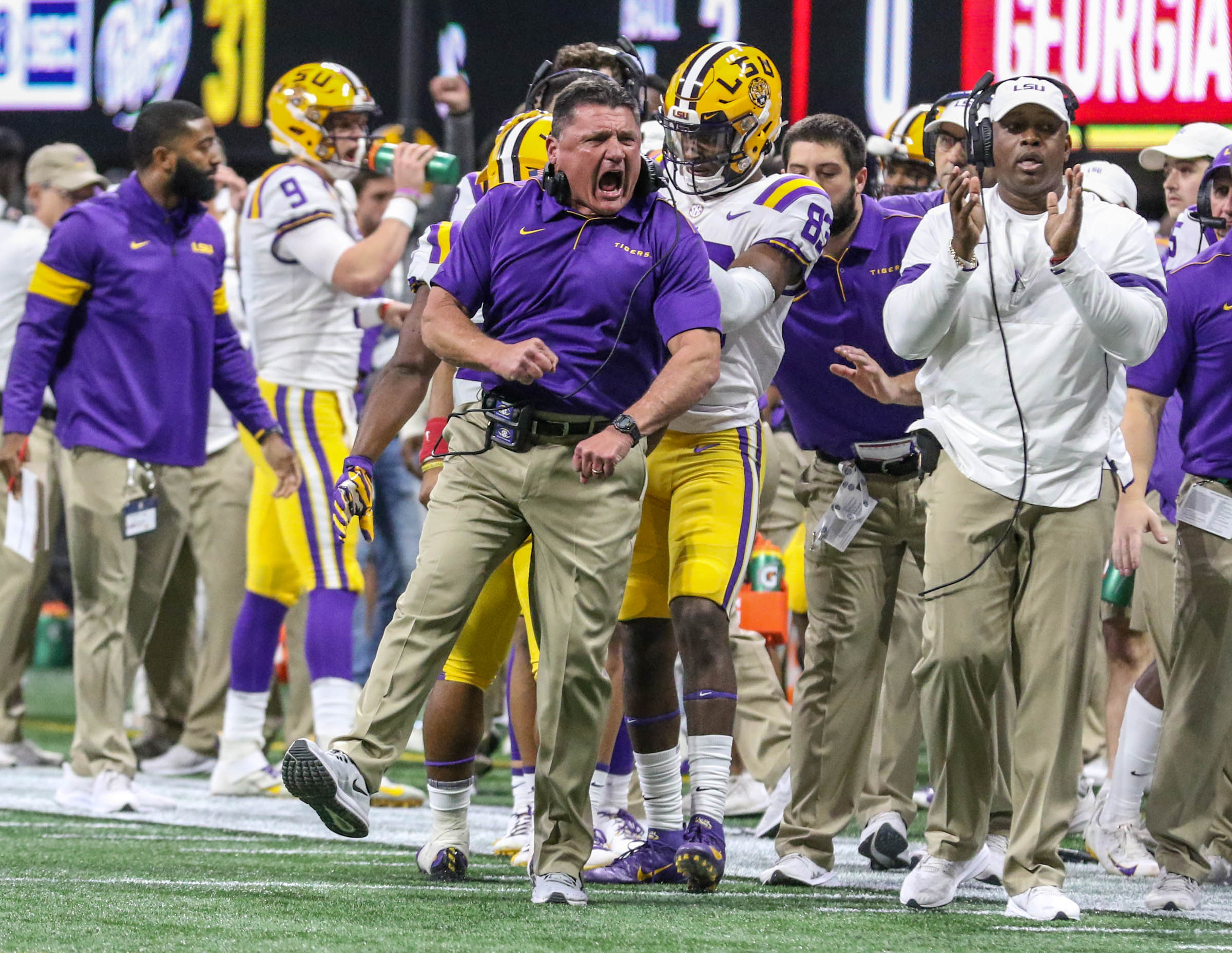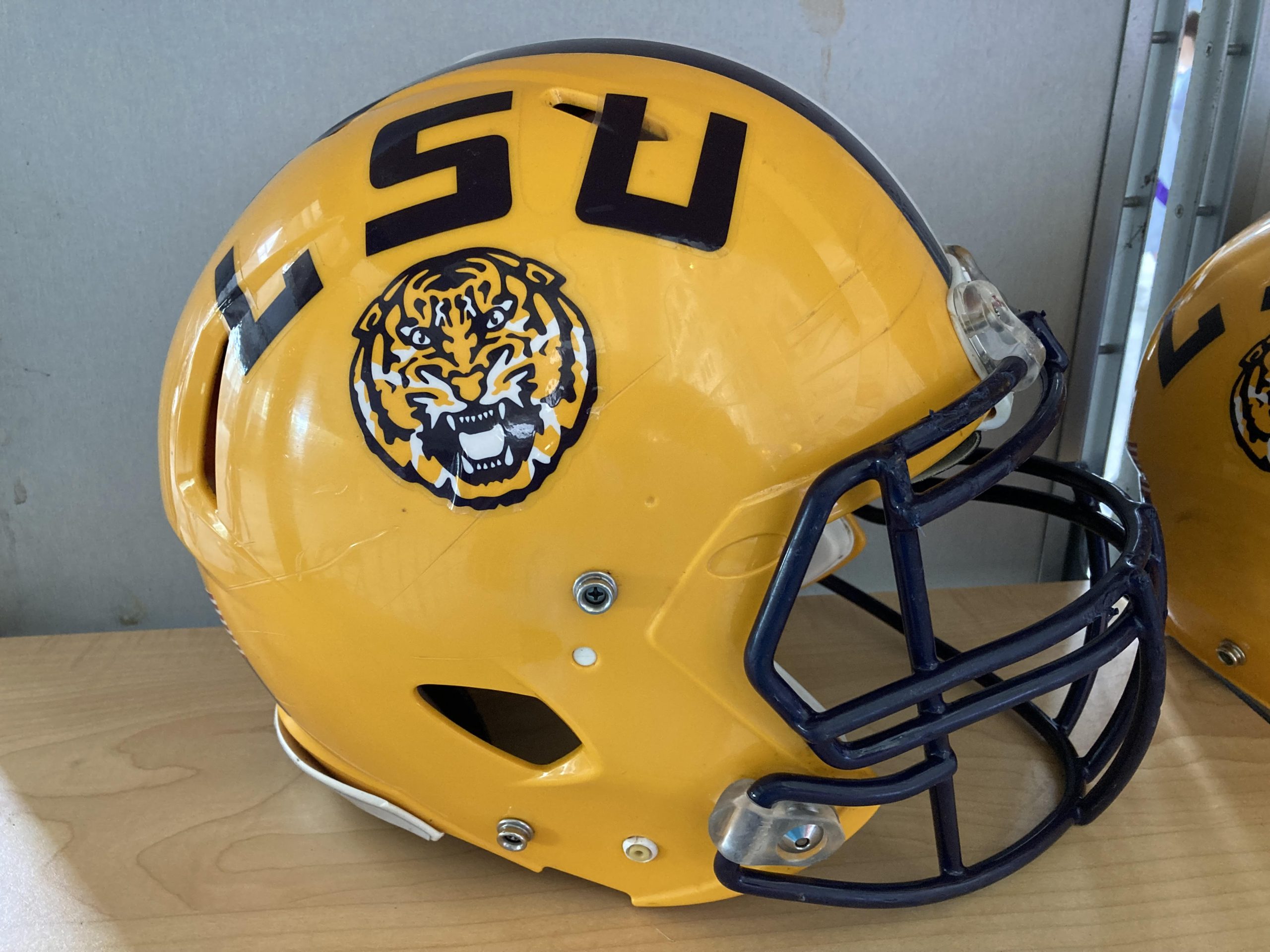
Conventional wisdom dictates that 20/20 hindsight is keenly accurate when analyzing football games that are part of the historical record. Looking ahead is much murkier, and crystal balls are elusive for football this fall. Anyone with 20/20 foresight about the 2020 season in the dog days of August has the most brilliant mind our planet has produced since Albert Einstein took his final breath in Paul Dietzel’s rookie year at LSU in 1955.
With COVID-19 taking more than 170,000 lives so far in America, big brains in ivory towers are scurrying madly to concoct a strategy to save college football. The last time LSU missed a season was in 1918 when a pandemic claimed 675,000 American souls.
Athletic Director Scott Woodward is furiously trying to preserve the $100 million juggernaut that pays the freight for all other campus sports endeavors. With substantial revenue already lost with fewer games scheduled, a gaping hole in the budget will happen if no fans are seated in Death Valley when the season opens on September 26.
If major league baseball is a barometer, numerous players will contract coronavirus when hitting, spitting, sweating and bleeding begin on the field. Despite the risk of illness or worse, many of the game’s stars are eager to suit up and strive to keep school coffers from financial insolvency.
LSU possesses the lowest endowment of any school in the SEC, so boosters may be reluctant to pay for a season that never was. And the prospect for football in 2021 is far from certain. At press time, the rush is on to avert a fiscal collapse, maintain the brand and continue tradition. LSU without football is a campus minus its identity. If the lights go out on Nicholson Drive, Baton Rouge becomes Paris with no Eiffel Tower and New Orleans without the French Quarter.
Ten SEC games are slated because the show must go on in a region that craves its signature sport as a way of life and a rite of passage. Saturday night in Tiger Stadium is a birthright in these parts, and LSU is locked and loaded to possibly produce the first consecutive national championship seasons from a powerhouse that has won three of the last 17 NCAA football crowns.
Whatever happens in the next few months will be a monumental adjustment to life as we know it, and a shaky season is a recipe for surprise. What will be the reaction if three SEC West teams are 7-3 with 1-1 records against each other and 4-2 marks in the division? How will Ed Orgeron, Nick Saban and Gus Malzhan respond to a potential coin flip to determine which team from the West plays for the conference title in Atlanta?
These are wacky and unpredictable times that will be dramatically affected by the number and quality of players medically cleared for action each week. The chances of any team emerging unbeaten as LSU did a year ago are remote.
The LSU fandom is accustomed to years at the start of a decade being pivotal and notable. In the Tiger Rag era, here is a rundown of decade premieres.
1980: LSU opens a season for the first time since 1961 with someone other than Charles McClendon as head coach. The choice from Athletic Director Paul Dietzel was 34-year-old Bo Rein. The Ohio State grad lasted six weeks as coach, then his plane veered off course from Shreveport and landed in the Atlantic Ocean rather than Ryan Field in Baton Rouge.
Rein and pilot Lewis Benscotter died in the accident, leaving Dietzel in a bind as Rein’s staff looked for direction. Rather than installing himself as head coach. Dietzel opted for 38-year-old Jerry Stovall, who went 22-21-2 in four years. Dietzel was fired as AD a year before Stovall and probably regretted not returning to the sidelines. His words when insiders were encouraging him to pick up the pieces after Rein’s death seem odd today. “Coaching is a young man’s game. I’m too old,” said Tall Paul, who was 55 at the time.
Coach O starts this season at 59 while his Alabama counterpart turns 69 on Halloween.
1990: Mike Archer finishes his fourth and final season with a 5-6 record and closes at 27-18-1 when AD Joe Dean says LSU needs a top-flight college coach to lead LSU back to the top of the heap. Dean settled on Hudson “Curley” Hallman, who brought a 23-11 record in four seasons at Southern Miss. Few observers realized that Hallman’s Golden Eagles played above expectations because of their supremely gifted quarterback, not the head coach.
Future Pro Football Hall of Famer Brett Favre was the catalyst for the uncommon stature of the USM program during the Hallman years.
Curley stumbled to 16 wins in four years with the Tigers, one more victory that LSU recorded in one campaign in 2019. Hallman’s high point was a stunning upset of unbeaten Alabama in 1993 and a sugary biography written before his first game. Bruce Hunter’s book was titled “Taking Charge” and detailed Hallman’s devotion to God.
The devil unfortunately prevailed against Curley 28 times in 44 games.
2000: Joe Dean, who made the worst hire in LSU history with Hallman, made the best hire for his alma mater with Nick Saban, who had his maiden voyage in 2000. Saban inherited a program that had suffered eight losing seasons in eleven years. Since Saban’s arrival, LSU has won at least eight games in a season for 21 consecutive years.
Saban’s Tigers were immediately competitive with the nation’s best and posted an 8-4 record. A year later, LSU won its first SEC title in 13 seasons. Three years later, the Tigers were national champions for the first time in 45 seasons. Saban left Tigertown after five memorable tours through the SEC, leaving a remarkable roster for Les Miles, who captured another national title 36 months later.
2010: Les Miles starts his sixth year at LSU, becoming the longest serving head football coach since McClendon.
Miles was under fire after going 8-8 in the SEC in 2008 and 2009. He responded with a strong season, producing an 11-2 mark, beating Alabama 24-21 and capping the year with a 41-24 rout of Texas A&M in the Cotton Bowl.
Miles set the stage for a spectacular season in 2011. LSU went 13-1 but dropped a 21-0 decision to Alabama in the BCS Championship Game, opening wounds that were not healed until the triumphant season of 2019.
A year ago, no opponent could halt an amazing Tiger train that rode roughshod through the postseason.
Counting the SEC Championship win over Georgia, the national semifinal against Oklahoma and the title game against Clemson, LSU outpointed a trio of foes with a combined record of 38-2 in games against everybody else by a margin of 142-63.
No team in college football history has ever come down the stretch and dominated three such potent opponents in a row by an average of more than 26 points per game.
Ed Orgeron reached the pinnacle at age 58. He starts 2020 with 16 straight victories. If Coach O follows with an encore under these circumstances, he will be a legend for the ages.




Be the first to comment